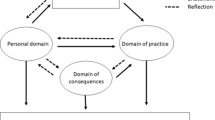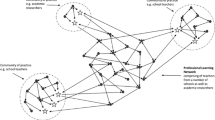Abstract
This paper draws on the findings of a research project funded by the Liverpool City of Learning consortium in the UK. The aim is to explore the process of introduction of ten authority wide learning networks, the impact these have on school professionals practice, the opportunities they offer for CPD and the extent to which they may impact on pupil learning. The research presented here draws on findings from a questionnaire distributed to school professionals and key issues emerging from their analysis point to the influence of national government agendas on school professionals’ interpretation of the purpose of the networks. They also point to the views of staff regarding the impact of the attainment agenda as well as the extent to which an increased emphasis on social inclusion and wider understandings of learning and achievement (which are less well represented by results-based performance monitoring) are having on their hopes for what Learning Networks might deliver. The expectations of staff of the opportunities offered by learning networks for long term professional development provide some interesting insights, and perhaps, some useful pointers as to how networks of this kind might develop in the future.
Résumé
COMMENT LES PERCEPTIONS DES RÉSEAUX D’ÉTUDE SE FORMENT-ELLES PARMI LES PROFESSIONNELS ET LES DIRECTEURS D’ÉCOLE À UN PREMIER STADE DE LEUR INTRODUCTION ? – Cet article repose sur les rÉsultats d’un projet de recherche financÉ par le Consortium d’Étude de la ville de Liverpool au R-U. Son but est d’explorer le processus d’introduction de dix rÉseaux d’Étude disposant d’une large autoritÉ, l’impact que ceux-ci ont sur la pratique professionnelle scolaire, les opportunitÉs qu’ils offrent pour le DPC et jusqu’À quel point ils influent sur l’apprentissage des Élèves. La recherche prÉsentÉe ici repose sur les rÉsultats d’un questionnaire distribuÉ À des professionnels de l’École, et les questions clÉs Émergeant de leur analyse soulignent l’influence des agendas des gouvernements nationaux sur l’interprÉtation que les professionnels des Écoles font du but de ces rÉseaux. Ellels soulignent Également les vues du personnel concernant l’impact de l’agenda d’accomplissement et dans quelle mesure une insistance accrue sur l’inclusion sociale et une comprÉhension plus large de l’apprentissage et de l’accomplissement (moins bien reprÉsentÉs par une surveillance des performances basÉe sur les resultats) jouent sur leurs espoirs concernant ce que les RÉseaux d’Étude peuvent fournir. Les espÉrances du personnel quant aux opportunitÉs offertes par les rÉseaux d’apprentissage pour le dÉveloppement professionnel À long terme fournissent quelques aperçus intÉressants et peut-être quelques indications utiles sur la façon dont les rÉseaux de cette sorte se dÉvelopperont À l’avenir.
Zusammenfassung
ZUR WAHRNEHMUNG NEU EINGEFÜHRTER UNTERRICHTSNETZWERKE DURCH PROFESSIONELLES SCHULPERSONAL UND DIREKTOREN – Dieser Beitrag beruht auf den Ergebnissen eines Forschungsprojekts, das vom Liverpool City of Learning Consortium, UK, gefördert wurde. Das Projekt erforscht den Prozess der EinfÜhrung zehn autoritätsbezogener Unterrichtsnetzwerke unter den Fragestellungen: Welchen Einfluss haben diese Netzwerke auf die Praxis des professionellen Schulpersonals? Welche Möglichkeiten bieten sie fÜr CPD? Bis zu welchem Grad wirken sie sich auf die Lernleistung der SchÜler aus? Das hier vorgestellte Projekt beruht auf den Ergebnissen einer Fragebogenuntersuchung unter professionellem Schulpersonal. Aus der Analyse abgeleitete SchlÜsselthemen zeigen auf, welchen Einfluss die Regierungsprogramme auf die Einschätzung professioneller Schulmitarbeiter Über den Zweck der Netzwerke haben. DarÜberhinaus geben sie die Meinung der Mitarbeiter Über die Auswirkungen des Leistungsprogramms wieder und weisen auf das Ausmaß hin, das die verstärkte Betonung sozialer Einbindung und das erweiterte Verständnis von Lernen und Leistung (welches in Ergebnis-basierten Leistungsvergleichen wesentlich weniger gut dargestellt wird) auf die Hoffnungen der Mitarbeiter hinsichlich der Netzwerke haben. Die Erwartungen der Mitarbeiter an die durch die Lernnetzwerke eröffneten Möglichkeiten einer langfristigen professionellen Entwicklung liefern interessante Erkenntnisse und geben nÜtzliche Hinweise auf die potentielle Weiterentwicklung solcher Netzwerke in der Zukunft.
Resumen
¿QUÉ IDEA SE FORMAN LOS PROFESIONALES Y TUTORES DE CURSO SOBRE LAS REDES DE APRENDIZAJE EN UNA FASE TEMPRANA DE SU IMPLANTACIÓN? – Este trabajo expone los resultados de un proyecto de investigaciÓn financiado por el grupo Liverpool City of Learning en el Reino Unido. El objetivo es el de explorar el proceso de introducciÓn de diez redes de aprendizaje que abarcan diferentes instituciones, su impacto sobre el desempeño de los profesionales, las oportunidades que ofrecen al desarrollo profesional continuo (CPD) y el alcance de su posible impacto sobre el aprendizaje de los alumnos. La investigaciÓn presentada en este trabajo esboza los conocimientos que se obtuvieron a travÉs de un cuestionario distribuido entre los profesionales de las escuelas, y los resultados centrales que surgen de su análisis indican la influencia que las agendas del gobierno nacional ejercen sobre la interpretaciÓn de los profesionales en cuanto a la finalidad de las redes de aprendizaje. Además, estos resultados centrales señalan los puntos de vista del equipo docente en cuanto al impacto de este programa de logros y en cuanto a la medida en la que un mayor Énfasis en inclusiÓn social y conceptos más amplios de aprendizaje y rendimiento (que no se ven tan bien representados con un monitoreo del rendimiento basado en resultados) podría alimentar sus esperanzas en cuanto al aporte de las redes de aprendizaje. Las expectativas del cuerpo docente en cuanto a las oportunidades que ofrecen las redes de aprendizaje para el desarrollo profesional a largo plazo proporcionan algunos conocimientos interesantes y, quizás, algunas indicaciones útiles sobre cÓmo se podrían desarrollar en el futuro las redes de aprendizaje de esta índole.
Similar content being viewed by others
References
Altrichter H. 2005. The Role of the ‹Professional Community’. Action Research. Educational Action Research 13(1), 11–25
Anderson L. 2001. A ‹Third Way’ Towards Self-Governing Schools?: New Labour and Opting Out. British Journal of Education Studies 49(1), 56–70
Barber, M. 2001. High Expectations and Standards for All, No Matter What: Creating a World Class Education Service in England. In: Taking Education Really Seriously: Four Years' Hard Labour, ed. by M. Fielding. London: Routledge Falmer
Black, P., R. McCormick, M. James, and D. Pedder. 2006. Learning How to Learn and Assessment for Learning: A Theoretical Inquiry. Research Papers in Education 21(2): 119–132
Carmichael, P., A. Fox, R. McCormick, R. Procter, and L. Honour. 2006. Teacher’s Networks in and out of School. Research Papers in Education 21(2): 23–40
Cassell, C., and G. Symon. 2006. Taking Qualitative Methods in Organization and Management Research Seriously. Qualitative Research in Organizations and Management: An International Journal 1: 4–12
CPA (Committee of Public Accounts). 2006. House of Commons, Eighteenth Report: Department for Education and Skills: Improving School Attendance in England. January 2006: The Stationary Office
Darling-Hammond L., M. W. McLaughlin 1995. Policies that Support Professional Development in an Era of Reform. New York: Centre for Restructuring Education, Schools and Teaching
Drazin, R., M. Glynn, and R. Kazanjian. 1999. Multilevel Theorizing about Creativity in Organizations: A Sensemaking Perspective. The Academy of Management Review 24(2): 286–307
Fitz J. 2003. The Politics of Accountability: A Perspective from England and Wales. Peabody Journal of Education 78(4), 230–241
Gorard S. 2005. Academies as the “Future of Schooling”: Is This an Evidence Policy? Journal of Education Policy 20(3), 369–377
Hargreaves, D. 2003. Education Epidemic: Transforming Secondary Schools Through Innovation Networks. Demos
Hodkinson, H., and P. Hodkinson. 2005. Improving Schoolteachers’ Workplace Learning. Research Papers in Education 20(2): 109–132
Jackson, D. 2002. The Creation of Knowledge Networks: Collaborative Enquiry for School and System Improvement, CERI/OECD/DfES/QCA/ESRC Forum. Knowledge Management in Education and Learning. Oxford 18–19 March 2002
Jackson, D. 2005. Effective Networks: What We Know Helps Collaborative Success. In: Establishing a Network of Schools: Developing a Network Perspective, ed. by T. Bentley, D. Hopkins and D. Jackson. NCSL
Lave J., E. Wenger 1991. Situated Learning: Legitimate Peripheral Participation. Cambridge: Cambridge University Press
Leadbeater, C. 2004. Learning about Personalisation: How Can We Put the Learner at the Heart of the Education System? DfES
Leadbeater, C. 2005. The Shape of Things to Come: Personalised Learning through Collaboration. DfES/NCSL
Levacic, R., A. Jenkins, A. Vignoles, and R. Allen. 2006. The Effect of School Resources on Student Attainment in English Secondary Schools. London: Institute of Education and Centre for the Economics of Education
Lieberman A., M. Grolnick 1996. Networks and Reform in American Education. Teachers College Record 98(1), 7–45
Little J. 1993. Teachers’ Professional Development in an Era of Reform. New York: National Centre for Restructuring Education, Schools and Teaching
NCSL. 2004. The Existing Knowledge Base around the Impact of Networking and Collaboration. Perspectives on Networking. Spring 2004
O’Brien, M. 2006. From Concept to Implementation: Interim Report of the Liverpool Learning Networks Research Project. Liverpool City of Learning. http://www.liv.ac.uk/learningnetworks/documents/interim_report_1.pdf, June
Ofsted. 2005. Primary National Strategy: An Evaluation of its Impact in Primary Schools 2004/5
Rutherford D. 2005. Headteachers’ Reflections on Primary Headship from 1988–2003: An Exploratory Study. Journal of Educational Administration 43(3), 278–294
Sachs, J., and S. Groundwater-Smith. 1996. Celebrating Teacher Professional Knowledge: School Reform and Teachers’ Professional Judgement. Paper presented to Re-engineering Education for Change, UNESCO and Asia Pacific Centre for Educational Innovation Development, Bangkok
Sullivan, H. 2007. Interpreting `Community Leadership' in English Local Government. Policy & Politics 35(1): 141–161
Taylor, M., and J. Callahan. 2005. Bringing Creativity into Being: Underlying Assumptions that Influence Methods of Studying Organizational Creativity. Advances in Developing Human Resources 7(2): 247–270
Tomlinson S. 2001. Education Policy, 1997–2000: The Effects on Top, Bottom and Middle England. International Studies in the Sociology of Education 11(3), 261–278
Wenger E. 1998. Communities of Practice: Learning, Meaning and Identity. Cambridge: Cambridge University Press
Wise C., L. Anderson, T. Bush 2001. Foundation Schools and Admissions: the Local Dimension. School Leadership and Management 21(4), 383–395
Wrigley, T. 2006. Selection, Selection, Selection. Improving Schools 9(1)
Author information
Authors and Affiliations
Corresponding author
Appendices
Appendix 1: ‹Early Perceptions’ questionnaire responses – a summary of quantitative responses to the ten statements
Appendix 2: Mean ratings and significance tests
1. By phase: primary versus secondary
2. By phase and role: primary headteachers versus secondary headteachers
3. By role: headteachers versus school professionals
Rights and permissions
About this article
Cite this article
O’Brien, M., Varga-Atkins, T., Burton, D. et al. How are the Perceptions of Learning Networks Shaped Among School Professionals and Headteachers at an Early Stage in their Introduction?. Int Rev Educ 54, 211–242 (2008). https://doi.org/10.1007/s11159-008-9084-1
Received:
Accepted:
Published:
Issue Date:
DOI: https://doi.org/10.1007/s11159-008-9084-1




